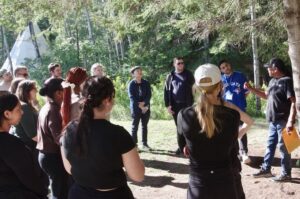Lakehead University Bora Laskin Faculty of Law students learn from the land

By Rick Garrick
NEEBING — Two groups of Lakehead University Bora Laskin Faculty of Law students recently attended the Gaa-maada’ooniding Law Camp 2024 at the School of Indigenous Learning (SOIL) over two weeks in September. About 90 first-year law students attended the camp at SOIL, which is located south of Thunder Bay and about five minutes north of the U.S. border.
“It was very exciting, it was nice to put SOIL on the map for first-year law students,” says Jeordi Pierre, owner at SOIL and Fort William citizen. “They’re going to be here for the next three years so to give them some insight on the Indigenous people and how we are was very valuable for us and also for the students.”
Pierre says the camp included a variety of activities and teachings, including sweetgrass braiding teachings, the Seven Grandfather Teachings, a Medicine Walk, an Anishinaabemowin segment, some projects, the history of the Indigenous people of Canada, and campfire teachings.
“The big thing out here is it’s a camp so they’ve been given the opportunity to stay in the teepees overnight, which is very exciting,” Pierre says. “One of the big things we like to do is show people how easy it is to cook on the fire. The teaching behind cooking is it brings people together, communities still practice this up in the north [and] it’s all about sharing our stories.”
Larissa Speak, professor at the Bora Laskin Faculty of Law, co-director of the Bora Laskin Faculty of Law’s Indigenous Law and Justice Institute and Fort William citizen, says the group of law students were split up into two groups of 45, with each group attending the camp for three days.
“They spend three intensive days out here doing land-based activities, eating together, working together — the idea is to do that before they really get into the classroom,” Speak says. “Part of what we’re doing at the Bora Laskin Faculty of Law is trying to, as best we can, teach people about Indigenous perspectives, Indigenous ways of knowing and being, and also teaching Indigenous law. We thought what better way than to get out here and have a community-led Law Camp to get students introduced to Indigenous ways, Indigenous teachings before we go back into the classroom.”
Robin Sutherland, director of Indigenous relations at the Bora Laskin Faculty of Law and co-director of the Bora Laskin Faculty of Law’s Indigenous Law and Justice Institute, says the students were having a lot of new experiences at the Law Camp.
“Right now, they’re braiding sweetgrass — I don’t think any of them have done that before in their lives,” Sutherland says. “Just spending this much time outdoors is a new experience for a lot of people that aren’t used to that. Last year some of the feedback we heard from some of them was they were more tired, more hungry than they’d ever been and that’s just from spending this much time outside. It’s just natural, it happens and we’re used to it, we take that for granted in the north.”
Carly Brar, a first-year law student and Long Lake #58 citizen, says she enjoyed being on the land during the Law Camp.
“I really enjoyed the Medicine Walk because I didn’t realize how many traditional medicines were used and then the instructor also showed us why they are used,” Brar says. “I got to learn a lot about what’s around us.”
Pierre says they have had visitors from around the world at SOIL, which he started in 2017 to provide an opportunity for youth to get back out on the land.
“We’ve had a lot of positive feedback,” Pierre says. “We try and include a bit of our language because this school is built to educate our young people — we find that our young people do not have any cultural background, they don’t know their language and we’re just trying to give them a sense of belonging. A lot of our kids struggle with identity issues and that’s what this school was built for.”


